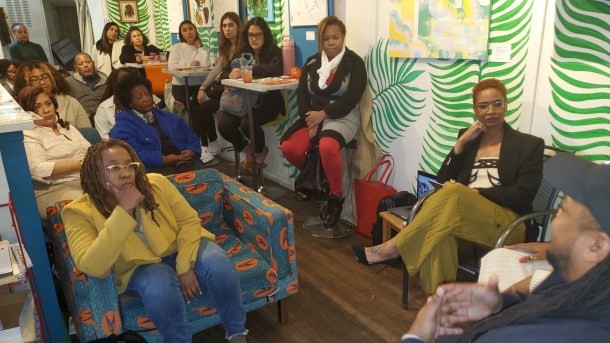By Antonio Ray Harvey
CBM Newswire
December 13, 2023
The California Black Health Network (CBHN) hosted a conversation focused on the mistrust of healthcare providers among Black Americans at Black-owned Drip Espresso, a popular coffee shop in Sacramento and a community partner of the organization.
The CBHN’s Health4Life initiative discussion, titled “Health Care in Your Hands: Taking the Power to the People,” drew a full house of attendees.
“Tonight’s event is one of many efforts to connect with the community and educate all of us about how to get better results and have better interactions with the health care system,” said the event’s moderator Amber Bolden, Director of Communications and Development at Voice Media Ventures, a Black-owned-and-operated firm in Riverside that specializes in community outreach and engagement.
“In short: It was to arm the community with tools to have more positive interactions with the health care system,” Bolden continued.
The first speaker, Dr. Italo Brown, is a board-certified emergency room physician, health equity advocate and an assistant professor in Emergency Medicine at Stanford University School of Medicine.
He shared his personal journey as a medical professional, emphasizing that there is no “perfect strategy” in the pursuit of the best health care available.
“What I encourage people to do is be open enough with your health journey to exchange what’s working with other people,” Brown said. “You have to build a community in your health practice. Information sharing is highly beneficial.”
The second speaker was Mo’Nique Campbell, a Black trans woman and health educator who is a Trans Service Program manager at San Francisco Community Health Center. Her work centers on medical and mental healthcare.
Campbell says she encourages patients to learn as much as they can about their practitioner and develop a long-lasting relationships with healthcare providers.
“It’s not an interview where I am giving you, like, a simple job. This is my life. My body is my fortress and I’m leaving you responsible for it,” Campbell said. “So, I need to know your experiences and how I can help you. I know that I am going to be sitting there as a patient and an educator.”
There is a well-documented history of the medical establishment mistreating and misdiagnosing Black patients and approaching their care with deep racial biases. There is also a troubling history of conducting experiments on enslaved people, enforcing sterilizations of Black women and the infamous Tuskegee syphilis study that denied treatment to about 400 Black men for decades as doctors monitored the progression of the disease in their bodies.
At CBHN’s community session, the case of Henrietta Lacks was discussed. Lacks was one of a diverse group of patients who unknowingly donated cells at John Hopkins University in 1951. The donation of Henrietta Lacks’ cells began what was the first, and, for many years, the only human cell line able to reproduce indefinitely.
Her cells, known as ‘HeLa cells’ for Henrietta Lacks, remain a remarkably durable and prolific line of cells used in research around the world. Lacks’ story impacted medical science and the field of bioethics.
Advocates say Lacks’ story is one of the numerous true incidents that fuel the mistrust Black Americans hold towards the medical establishment.
In January 2022, Dr. Carolyn Roberts, a professor at Yale University, raised the issue of the medical establishment’s troubled historical relationship with African Americans during her testimony before the California Task Force to Study and Develop Reparation Proposals for African Americans.
“It is important for us to recognize that many critical issues that we are wrestling with today have long, old, and deep historical roots,” Roberts said. “These include racial bias and disparate medical treatment, race-based medicine, and medical exploitation. In our historical analysis, we must consider not only American slavery and its afterlife, but also the transatlantic slave trade.”
The leadership of CBHN says, that through forums like the one held in Sacramento, the organization brings attention to the healthcare system’s obligation to guarantee that all patients, including Black Americans, are receiving dignified, and respectful treatment and high-quality care.
The Health 4 Life program is a “Healthy Black People” campaign that empowers all Black Californians with “How Do I…” information and resources needed to help them navigate the system, advocate for friends, family, and individuals, and take action when faced with discrimination.
During the conversation, Bolden referenced the California Health Care Foundation (CHCF)’s “Listening to Black California” study.
The CHCF compiled the report after listening to Black Californians’ experiences with racism and healthcare.
Considered as one of the most comprehensive studies focused on the healthcare experiences of Black Californians to date, the study included a survey of 3,325 Black Californian adults, in-depth interviews with 100 Black Californians, and 18 statewide focus groups.
“It is one of, if not, the largest study exploring the experiences of Black Californians in the state’s health care system,” Bolden told attendees.
According to the report by CHCF, Black Californians are highly intentional in their pursuit of physical and mental health. Most Black Californians report focusing on their mental health (79%); getting appropriate screenings or preventive care (77%); and tracking health indicators, such as blood pressure and cholesterol (71%).
The report concluded that most Black Californians, “have health insurance, get preventive screenings, prepare for visits to the doctor, monitor their physical health, and want the healthcare system to meet them halfway.”
“(The study) arms the community with tools to have more positive interactions with the health care system,” Bolden said.
